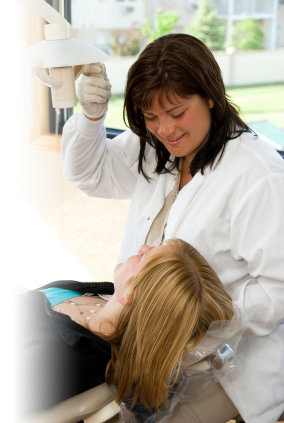Nervous or worried about dental treatment?
Being nervous or scared about going to the dentist affects people in different ways.

Some are anxious about specific aspects of dental treatment. Others dislike being in such close contact with someone that they don’t know very well.
Some people have had unpleasant experiences as children, and are frightened that these will be repeated.
There are also different levels of dental anxiety, ranging from slight nervousness to phobia (when someone knows that their intense fear is excessive and unreasonable). However anxious a person is, there are ways of dealing with the problem, one step at a time.
Dentists are aware that some patients are anxious, and are trained to take your fears seriously and deal with them sensitively.
Distraction techniques
It is sometimes helpful to distract attention away from the treatment.You can do this in a number of ways:
- Listen to music on a personal stereo or watch a DVD
- Concentrate on relaxing each part of your body in turn
- Think about something you are looking forward to
- Practise deep, slow breathing.
Oral sedation
This type of sedation involves swallowing sedative tablets approximately 45 minutes before dental treatment. All the DOs and DON’Ts for Intravenous sedation also apply to Oral Sedation and you’ll also need an escort to take you home.
Intravenous sedation
Is dental sedation for you?
Being afraid, or being scared of the Dentist, is an age old recognised and legitimate fear, sometimes called a “phobia”.
We, at Shelton Dental Centre, understand this very well and are specially trained to alleviate your anxiety.
We use a technique of conscious sedation which is safe and comfortable and can control fear, pain and anxiety. Sedation is a simple technique that has an effect that is pleasant and will remove any worries or fears you may have. You will feel very relaxed and will probably fall into a natural sleep.
The sedative effect lasts about one and a half hours, but you will feel as if your time with us was much shorter.
It is uncommon to have sickness or nausea after the sedation and, if accompanied, you can go home immediately after the treatment. You might experience amnesia.
You will be asked to complete a sedation questionnaire, which your dentist will complete with you on the day of treatment and ask you to sign. This acts as your consent form for us to carry out the sedation treatment.
Our clinical team is qualified to carry out your sedation and all attend regular courses to ensure we are able to offer you the most up to date and effective treatment available today.
Most people are suitable for sedation. Healthy people and people on certain medication can have sedation after a comprehensive check by our dentists. Exceptions are those who are pregnant, children under 16 or those who suffer from a serious physical disease.
For oral surgery and more complex treatment, we offer a combination of local anaesthetic and sedation.
Sedation is available for any kind of treatment you may require.
How is it done?
We will give you more information, answer your questions and show you what we intend to do.
A baby size Teflon cannula will be placed in your vein on the hand or in the arm and medication will be administered to bring you into a ‘twilight zone’ where pain and fear are not reality anymore. You become drowsy and unaware of the dentist or the treatment, but you will be able to co-operate with the surgeon and maintain your own protective reflexes at all times.
The sedation can be prolonged until the planned treatment is done. Local anaesthesia is often also used to control pain after the procedure.
What then?
During the procedure you may be asked to co-operate with the surgeon to test your bite or to open your mouth. You will not remember any of this.
You will not snore or disgrace yourself when under sedation. You will not lose ‘control’, as you are under control of your breathing, swallowing and coughing at all times and can move to stay comfortable.
After the procedure you will be escorted to a recovery area and will soon be able to go home accompanied by your escort.
You may be drowsy for an hour or two after the procedure.
What to do and not to do
Do:
- Eat normally on the day of sedation
- Have someone to collect you after the procedure
- Take the rest of the day off.
Don’t:
- Drink alcohol before the procedure
- Sign Legal documents after the procedure
- Drive a car, ride a bicycle or operate machinery
- Do any strenuous exercise for the rest of the day.
You should go home with your escort and relax or sleep until the effect of the medication has worn off.
Dietary Advice
In order to ensure successful treatment it is important to make sure that you follow a healthy diet, and where possible exclude foods with high level of sugar and acid. This includes avoiding all carbonated drinks, which lead to decay.
You should brush your teeth at least twice a day with a fluoride toothpaste, or as recommended by your dentist. Your dentist may recommend use of the specialist

